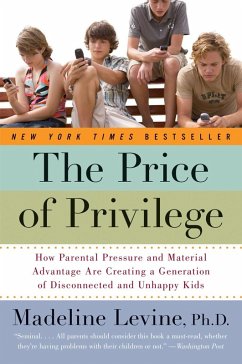Madeline Levine has been a practicingpsychologist for twenty-five years, but it was only recently that she began to observe a new breed of unhappy teenager. When a bright, personable fifteen-year-old girl, from a loving and financially comfortable family, came into her office with the word empty carved into her left forearm, Levine was startled. This girl and her message seemed to embody a disturbing pattern Levine had been observing. Her teenage patients were bright, socially skilled, and loved by their affluent parents. But behind a veneer of achievement and charm, many of these teens suffered severe emotional problems. What was going on?
Conversations with educators and clinicians across the country as well as meticulous research confirmed Levine's suspicions that something was terribly amiss. Numerous studies show that privileged adolescents are experiencing epidemic rates of depression, anxietydisorders, and substance abuserates that are higherthan those of any other socioeconomic group ofyoung people in this country. The various elements of a perfect stormmaterialism, pressure to achieve, perfectionism, disconnectionare combining to create a crisis in America's culture of affluence. This culture is as unmanageable for parentsmothers in particularas it is for their children. While many privileged kids project confidence and know how to make a goodimpression, alarming numbers lack the basic foundation of psychological development: an authentic sense of self. Even parents often miss the signs of significant emotional problems in their "star" children.
In this controversial look at privileged families, Levine offers thoughtful, practical advice as she explodes one child-rearing myth after another. With empathy and candor, she identifies parenting practices that are toxic to healthy self-development and that have contributed to epidemic levels of depression, anxiety, and substance abuse in the most unlikely placethe affluent family.
Conversations with educators and clinicians across the country as well as meticulous research confirmed Levine's suspicions that something was terribly amiss. Numerous studies show that privileged adolescents are experiencing epidemic rates of depression, anxietydisorders, and substance abuserates that are higherthan those of any other socioeconomic group ofyoung people in this country. The various elements of a perfect stormmaterialism, pressure to achieve, perfectionism, disconnectionare combining to create a crisis in America's culture of affluence. This culture is as unmanageable for parentsmothers in particularas it is for their children. While many privileged kids project confidence and know how to make a goodimpression, alarming numbers lack the basic foundation of psychological development: an authentic sense of self. Even parents often miss the signs of significant emotional problems in their "star" children.
In this controversial look at privileged families, Levine offers thoughtful, practical advice as she explodes one child-rearing myth after another. With empathy and candor, she identifies parenting practices that are toxic to healthy self-development and that have contributed to epidemic levels of depression, anxiety, and substance abuse in the most unlikely placethe affluent family.
Dieser Download kann aus rechtlichen Gründen nur mit Rechnungsadresse in A, B, BG, CY, CZ, D, DK, EW, E, FIN, F, GR, HR, H, IRL, I, LT, L, LR, M, NL, PL, P, R, S, SLO, SK ausgeliefert werden.


